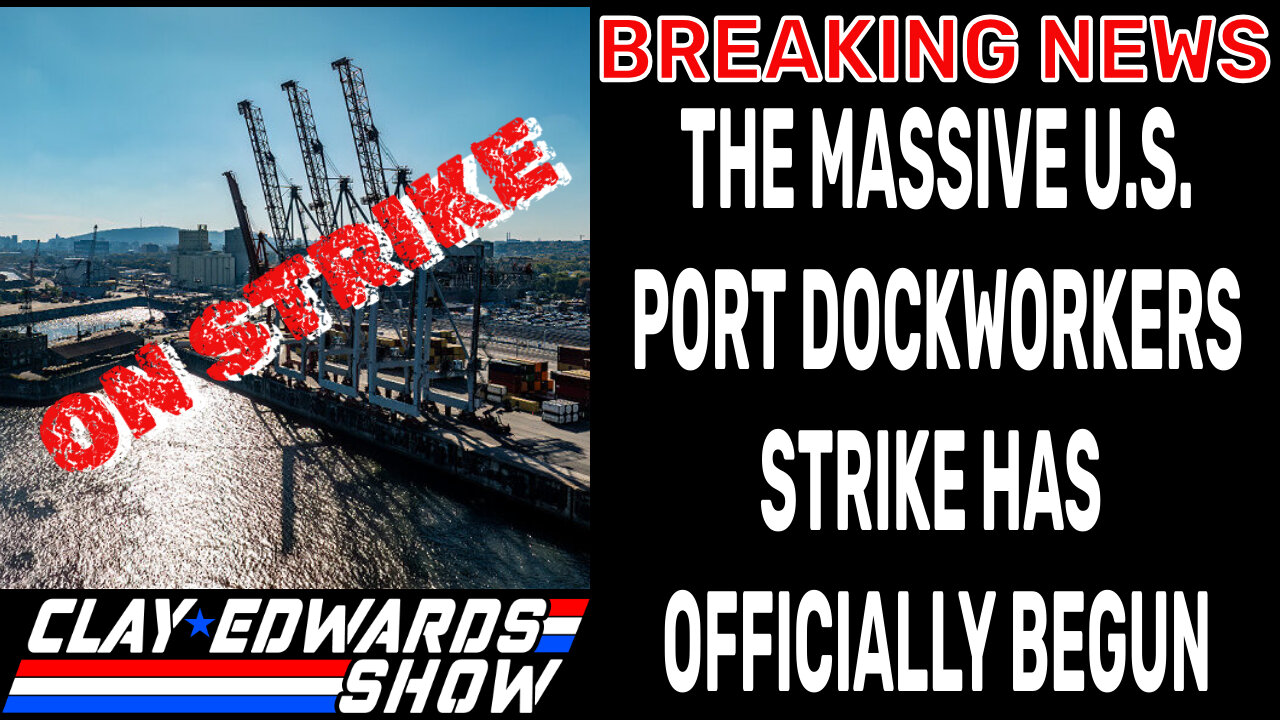Premium Only Content

BREAKING NEWS - The massive U.S. port strike has begun!
Thousands of dockworkers are officially on strike across the East Coast. It could cost the U.S. economy up to $5 billion each day
Thousands of dockworkers across the U.S. East Coast and Gulf Coast are officially on strike after negotiations between their union and an alliance of employers failed.
The International Longshoremen’s Association (ILA) represents more than 85,000 workers and has been negotiating with companies, terminal operators, and port associations represented by the United States Maritime Alliance (USMX) since last May. Without a contract between the groups, as many as 45,000 members are walking off the job at more than a dozen major ports, including facilities in New York and Texas.
Longshoremen — people who load and unload cargo at ports — on the West Coast are represented by a different union, which agreed to a contract last year.
“The Ocean Carriers represented by USMX want to enjoy rich billion-dollar profits that they are making in 2024, while they offer ILA Longshore Workers an unacceptable wage package that we reject,” the ILA said in a statement Monday afternoon.
The ILA is demanding higher wages and a salary that outpaces inflation, which is cooling after a long stubborn streak, and provides more than the small wage increases included in its last contract. Between 2018 and 2024, employees received a $1 per hour increase to their wages, to a maximum of $38 per hour — about $79,000 annually on a 40-hour work week — while new employees started at $20 an hour.
Workers are also pushing for protection against automation and new technology devices in terminals. Exact details of the union’s demands, or the alliance’s offers, haven’t been disclosed.
“The strike is back,” Todd Vachon, the director of Rutgers University’s Labor Education Action Research Network, said Monday, pointing to the various labor actions taken by unions over the past few years. “Unions have always fought to make bad jobs into good jobs. And when those jobs come under threat, they will fight to save them.”
USMX has countered that it has provided several offers since discussions began as far back as 2022, although negotiations kicked off in earnest in May. On Sept. 26, the alliance filed an unfair labor practice charge and requested the National Labor Relations Board require the union to resume bargaining before a strike breaks out. According to the alliance, the parties haven’t met in person since June.
“We remain prepared to bargain at any time, but both sides must come to the table if we are going to reach a deal, and there is no indication that the ILA is interested in negotiating at this time,” the alliance said on Sept. 23, according to a statement.
Read more: A big U.S. port strike could soon shake the economy. Here’s what to know
The strike is the first at these ports since 1977, when trade accounted for just 16% of the U.S. economy, compared to 27% in 2024, the Washington Post reported. ILA President Harold Daggett was among the workers who picketed at the time and recently called it a “tough strike.”
Ports and facilities handling approximately 51% of the nation’s overall port capacity are likely to be affected by the potential walkouts, according to the Mitre Corporation, and impact almost every industry, delaying everything from shipments of foreign fruit to supplies for automakers and pharmaceutical companies.
The potential damage of such a strike is expected to cost somewhere between $1 billion and $5 billion per day, according to analysis from shipping container marketplace Container xChange and J.P. Morgan. Oxford Economics has said a prolonged strike could impact up to 100,000 jobs and reduce U.S. economic activity by between $4.5 billion and $7.5 billion for every week it persists.
“The congestion and delays at these major ports will severely impact the availability of containers, increase costs, and disrupt schedules,” Container xChange CEO Christian Roeloffs, whose company works with more than 1,500 shipping companies, said in a Thursday advisory to customers.
Although the White House and federal agencies have encouraged the ILA and USMX to meet at the bargaining table, President Biden has signaled he won’t interfere with the workers’ strike. Under the Taft-Harley Act, the president can impose an 80-day period where workers go back to work while negotiators work on a deal.
A 177-member strong coalition of trade associations wrote to Biden weeks before the contract expired to ask him to invoke Taft-Harley and avoid the strike. Suzanne Clark, the president of the U.S. Chamber of Commerce, said failing to intervene would be “unconscionable,” according to a Monday letter to the president.
“It’s collective bargaining. I don’t believe in Taft-Hartley,” Biden told reporters on Sunday.
-
 1:50:39
1:50:39
Clay Edwards Show
7 days agoEXPOSING THE SCHOOL CHOICE AGENDA W/ SENATOR CHAD MCMAHAN (Ep #921)
64 -
 2:38:38
2:38:38
TimcastIRL
5 hours agoTrump Orders DOJ To FIRE EVERY Biden Attorney, Calls For CLEAN HOUSE w/Siaka Massaquoi | Timcast IRL
109K65 -
 1:29:31
1:29:31
Glenn Greenwald
8 hours agoGermany's Repressive Speech Crackdown Intensifies; U.S. & Russia Meet in Saudi Arabia and Open Cooperation; Plus: An Amazing Hate Crime in Florida is Buried | SYSTEM UPDATE #408
81.3K54 -

DLDAfterDark
2 hours ago $0.65 earnedDLD Live! What's Your Typical EDC/Civilian Load Out? Guns & Ammo & EDC?
9.56K -
 1:30:48
1:30:48
Redacted News
9 hours agoBREAKING! TRUMP AND PUTIN NEARING PEACE BUT EUROPEAN WARMONGERS TRYING TO STOP IT | REDACTED
164K239 -
 52:40
52:40
Candace Show Podcast
9 hours agoSaturday Night Lively: What Were They Thinking? | Candace Ep 148
142K148 -
 LIVE
LIVE
Man in America
4 hours agoDocumentary: The Money Masters 'How International Bankers Gained Control of America'
1,904 watching -
 1:10:40
1:10:40
PMG
1 day ago $0.98 earnedTom Hanks Plays a Racist MAGA Supporter On SNL!! UNBELIEVABLE
15.5K1 -
 2:11:29
2:11:29
Adam Does Movies
8 hours ago $1.62 earnedAsk Me Anything - Live!
24.3K -
 56:18
56:18
Flyover Conservatives
1 day agoFollow the Money: $4.7 Trillion in Government Fraud EXPOSED!; Flu Shots, Fear & Big Pharma Lies—What They DON’T Want You to Know - Dr. Stella Immanuel | FOC Show
29.4K